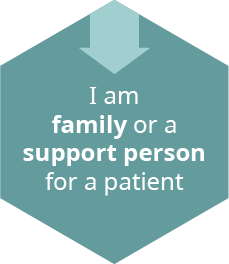
The Mental Health Act requires that a facility such as a hospital send a written notice to a near relative immediately after a patient’s admission, discharge or an application for a review panel hearing.
The patient needs to choose a near relative using Form 15: Nomination of Near Relative. If the patient does not or cannot choose one, the hospital will choose one or send the notice to the Public Guardian or Trustee if there is no information.
A near relative can be a grandfather, grandmother, father, mother, son, daughter, husband, wife, brother, sister, half-brother, half-sister, friend caregiver or companion designated by you. A near relative can also be a legal guardian or a minor and a committee having custody of you under the Patients Property Act. A common law spouse or same sex partner is considered a near relative. In addition, a near relative could also include a representative you name in a representation agreement.
You can also download the Information for Patients sheet here.
When a patient applies for a review panel hearing, the facility such as a hospital must immediately notify a near relative of the patient’s choosing.
A family member or friend may participate in a hearing either as a patient representative or as a witness. Alternatively, a family member or friend may observe a hearing as a support person.
Review panel hearings are held in private to protect the privacy of the patients. Family members and friends wishing to observe the proceedings without otherwise participating in them may normally do so only with the consent of the patient and the review panel. An observer cannot be a witness, except in extraordinary circumstances and with permission of the review panel.
A family member may present evidence as a witness at a hearing for the patient’s continued detention or discharge from involuntary status.
- Family members who wish to provide information in support of further detention of the patient should contact the attending physician.
- Those with information in support of the patient’s discharge should contact the patient or the patient’s representative.
- If neither party wishes to call the family member as a witness, the Mental Health Act states that any person who satisfies the review panel that the person has a material interest in, or knowledge of, matters relevant to the hearing may give evidence or make submissions at the hearing.
The Board encourages the patient to bring someone to represent them at the hearing. This may be a lawyer, advocate, family member, friend, near relative or other person who will advocate for and represent the interests of the patient. Anyone representing a patient cannot also be a witness, except in extraordinary circumstances and with permission of the review panel.
For more information on the role and responsibilities of patient representatives, please review Practice Direction – Guidelines for Patient Representatives.
Evidence presented by family members at a review panel hearing must be relevant to the hearing. The evidence may be submitted in writing or presented orally at the hearing such as in person or by phone. If a family member submits a written statement to the review panel, the patient’s representative may arrange to have the family member available to answer questions at the hearing by phone.
Oral evidence is preferred because it allows participants and review panel members to ask questions to clarify the evidence and provides the review panel with a better opportunity to assess the persuasiveness of the evidence. Unless the patient agrees or the review panel orders otherwise, family members and other witnesses must remain outside of the hearing room, except when giving evidence or making submissions to the review panel.
Occasionally, family members wishing to present evidence in support of continued involuntary detention ask the review panel to consider their evidence in confidence. Although the law allows the review panel chair to exclude the patient from all or part of the hearing if the chair is satisfied it is in the best interests of the patient, review panel chairs rarely exclude patients from a hearing, in order to preserve administrative law principles of fairness and hear evidence from family members in the presence of the patient. Experience has shown that it has often been possible to include evidence from family members in the hospital’s presentation in such a way as to minimize or avoid negative repercussions.

